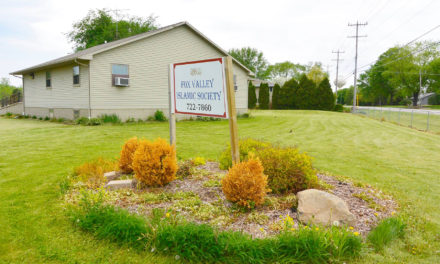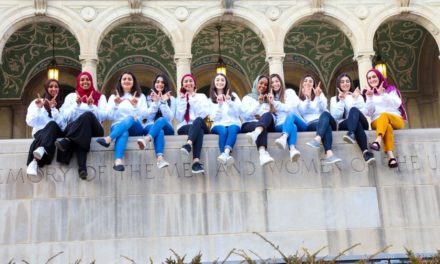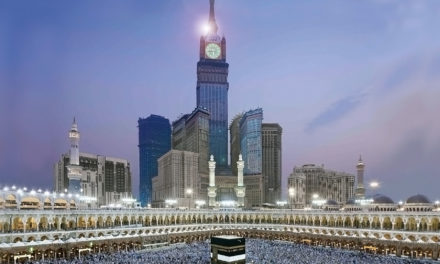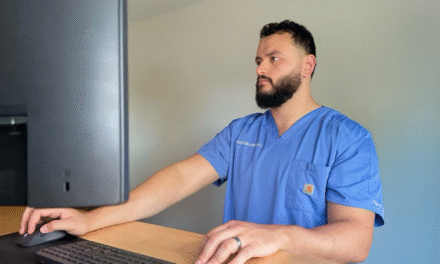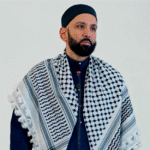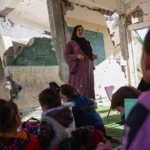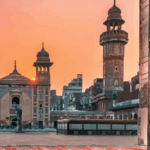© Photo
Yaseen Najeeb for the Wisconsin Muslim Journal
Courtesy of Casablanca
Most people know that Casablanca, a trendy restaurant and hookah lounge on Brady Street, now has a west-side location on Blue Mound Road. And some know that the Casablanca brand has been around Milwaukee for more than thirty years.
But many people aren’t aware of the extent to which Casablanca is both family owned and family operated, or that the family’s women play a significant role in the business.
Intessar Musa, one of nine children of Jesse and Fareezh Musa, manages Casablanca in Brookfield, which opened in June 2018. From a corner table in the spacious dining room, she described the children’s efforts to honor a legacy handed down by their father.
“Our father was a pastry chef in Chicago before opening the [original Casablanca] restaurant,” she said. In fact, the story goes even further back. “He told me that when he was a boy, he got up at 4:00 a.m. to deliver bread from a wooden cart.”
Jesse Musa, who was born in Jerusalem, opened a restaurant called Sahara Inn on Mitchell Street in the late 1980s, eventually changing the name to Casablanca. “He loved the movie,” Intessar said. “My father is a born romantic.”
The original Casablanca was “a small family-dining place with floral drapery and a red carpet,” said Intessar. However, it did occasionally feature a belly dancer, a tradition that the new, updated Casablanca continues.
With Jesse as their teacher, Intessar and her siblings learned the restaurant business from the ground up. “We all, in one way or another, worked in the business. We literally did everything,” she said.
When brothers Ramze, Alaa, and Nasser were 20, 19, and 18, “We approached our father and said, ‘if we open the restaurant, will you help with the menu and the food?’ and he said yes.” The youngest brother, Kareem, is currently head chef.
Casablanca on Brady opened in 2006. Now, in addition to the two Casablanca restaurants, the family owns Moosa’s, a walk-up eatery at Bradford Beach that serves burgers, wings, and custard.
When the brothers took over the business, they made Casablanca “more fun and modern,” Intessar said.
Like the Brady Street restaurant, Casablanca Brookfield is divided into sections. The large, airy dining area features Moroccan-themed, red-lit mirrors along one wall and soothing brown, beige, and red décor. On the other side is a bar and lounge where customers relax with hookahs.
Alaa Musa worked with a Gravelle Designs on both restaurants, which feature distinctive exteriors with second-floor patios. “He brought the vision together,” said youngest sister Neveen. “Alaa is the kind of person who hears something one time and remembers it. Every time he takes on a new venture, he masters it. But we all kind of fell into what we were most passionate about.”
Neveen Saadedin had dropped by with her husband Omar and their eight-month-old daughter Serene, a cheerful, easy-going baby. The Saaledin’s live in Phoenix, where Omar’s logistics business is based.
Omar travels with his own hookah, a high-tech model that his wife said is “the Tesla of hookahs.” He explains that in the Middle East, sharing the hookah was a simple, relaxing past-time that took place over a cup of tea. “Now they have them at pool parties,” he said.
And, Omar said, the hookah tobacco once came in far fewer flavors. Today, Casablanca offers specialty hookah flavors including lemon, double apple, mango, and melon, along with premium hookah flavors like Dragon’s Breath, Purple Haze, and Adios Blueberry.
Intessar said the Brookfield location caters to a customer base more oriented to professionals, with businessmen coming in for lunch, families for dinner, and young people visiting the lounge.
But the Brookfield location is also part of a trend toward increasing diversity and sophistication in the Milwaukee suburb. The day I visited, many of the patrons were indistinguishable from East Siders.
Both restaurants are places where patrons can “enjoy amazing food and a romantic atmosphere,” Intessar said. The menu is based on a wide range of Middle Eastern cuisines. “Grape leaves are Lebanese. Couscous is more Moroccan. Hummus and falafel are Palestinian,” said Intessar, while kabobs are found everywhere in the Middle East.
“My mom taught my dad a lot of the recipes,” Intessar said. “My parents love to feed people.”
And it’s clear that besides excellent food, family is a key ingredient to the restaurants’ success. Now that they’re not able to meet for dinner at “Mom’s house” every Sunday, the Musa siblings have a family Facebook group. “We didn’t take advantage when we were all in the same house, but now that we’re all so busy, we miss [being together],” Neveen said.
The Musas grew up in a religious household, “but we all observe differently,” Neveen said. Their parents emphasized “love for one another” and compassion for others. “My mom prays five times a day,” Neveen said. “My husband goes to Friday prayers. No two people are the same.”
The Musa family values extend to their patrons and their workers. “Our mission is to make everyone feel like family,” Intessar said. “All skin colors, religions. We are all one. That’s the true Muslim way.”
That openness and generosity have always centered around sharing food. “[When] you came to our house, you didn’t leave until you had a five-course meal,” Intessar said. The day I visited, I left with an order of delicious falafel and hummus.
And the generosity extends to the friendly, professional restaurant staff. As the hostess told me, if you’re working a shift, “They’ll make sure you eat.”










